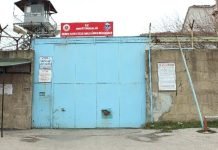Ferda Öztürk, who earlier reported she had been strip-searched during a visit to her husband in prison, has been banned from the prison for six months, according to Bold Medya.
Öztürk claimed she was strip-searched along with her two children, aged 10 and 15 months, on November 7 during a visit to her husband in Ankara’s Sincan Prison.
“Strip-search is an ongoing practice in Turkish prisons,” human rights defender and Peoples’ Democratic Party (HDP) lawmaker Ömer Faruk Gergerlioğlu said on Tuesday in a speech in the Turkish parliament.
Gergerlioğlu read letters from female inmates and visitors who had recently been subjected to strip-searches in prisons. Children have also been forced to endure such embarrassing procedures, Gergerlioğlu said.
The practice of conducting strip-searches in Turkish prisons was vehemently denied by Interior Minister Süleyman Soylu and ruling Justice and Development Party (AKP) lawmaker Özlem Zengin when it was first brought to the nation’s attention by Gergerlioğlu in late 2020, prompting scores of women as well as men to share on social media their experiences of strip-searches.
According to Turkish legal and preventative search regulations, strip-searches can only be conducted in exceptional cases, such as when there are credible indications that the person has contraband materials on them. In such cases the search must be conducted in a manner so as not to humiliate the person and as quickly as possible. When there is a credible suspicion that something is hidden in the person’s body, officers are required to ask the person to remove it themselves and inform them that if they disobey, the removal will be done by the prison doctor.
The European Court of Human Rights has found strip-searches to constitute degrading treatment when not justified by compelling security reasons and/or due to the way they were conducted.
But the practice has been used frequently by Turkish security officers against people suspected or convicted of political crimes, especially since the coup attempt in July 2016.















